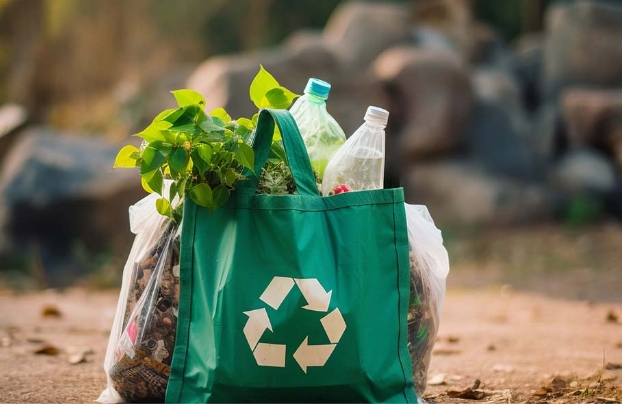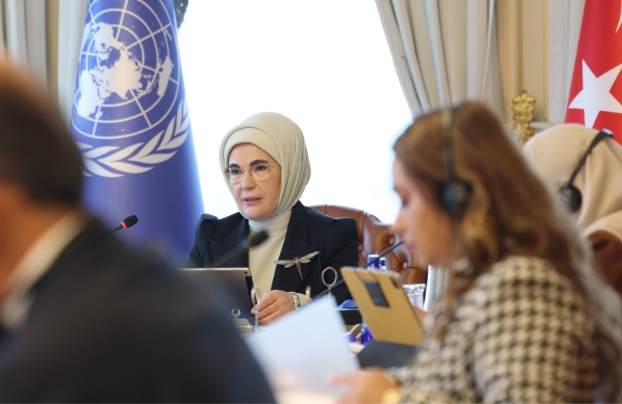Zero Waste

The "Zero Waste Summit" was held under the "Zero Waste Project," which was initiated by the Ministry of Environment, Urbanization, and Climate Change in 2017 to control waste within the framework of sustainable development principles and to leave a cleaner and more livable world for future generations, under the patronage of Mrs. Emine Erdoğan.
The "Zero Waste Summit" was held at the Beştepe National Congress and Culture Center, marking one year since the launch of the Zero Waste Project. The summit addressed the current status and impacts of the project in Turkey and around the world.
During the summit, attended by Mrs. Emine Erdoğan at the Presidential Complex, discussions focused on the environmental, social, and ethical dimensions of the project, as well as its contribution to the circular economy. Experiences related to good practice examples were also shared.
In her speech, Mrs. Emine Erdoğan stated, “With the Zero Waste Project, we aim for a more livable environment and a stronger economy by separating waste at its source and ensuring its recycling. Launched in October 2017, this project has reached a significant stage thanks to the diligent efforts of the Ministry of Environment, Urbanization, and Climate Change. The initiative we started at the Presidential Complex, the Grand National Assembly of Turkey, and ministry buildings is spreading throughout the country. Over the past year, we have received wonderful support from all segments of society. Our industrialists, businessmen, and universities have established exemplary systems within their institutions. I commend each of them for their environmental awareness. Now, the major responsibility lies with our municipalities. Citizens need to ensure that the waste they separate at home is collected and processed by municipalities in the same manner. Municipalities must move away from landfilling and focus on recycling instead of disposal or incineration. Integrated facilities that convert waste into energy or compost should be established in all our cities. We must also put aside the throwaway culture and initiate a change. The first step in this is our individual attitudes.”
In his speech, Minister of Environment, Urbanization, and Climate Change Murat Kurum emphasized that the Zero Waste Project is a project for saving and efficiency. He noted, “We have shifted waste from being a priority issue to being seen as a source for raw materials and new products. In the approximately one year since the project was implemented, 2.2 million tons of packaging waste, 58,000 tons of waste electrical and electronic equipment, 38,000 tons of plant waste, and 80,000 tons of waste mineral oil, and 184,000 tons of end-of-life tires have been collected separately at the source for recycling. Our goal is to spread this practice throughout the country with the Zero Waste Regulation we will publish in the coming days. In this regard, our municipalities have significant responsibilities. According to the regulation we have prepared, our municipalities will provide services to collect waste separately using a dual collection system. We have given municipalities until the end of 2019 to implement this. From January 1, 2019, we will charge for plastic bags. This way, the annual use of plastic bags per person, which is currently 440, will drop to 90 by the end of 2019 and to 40 by 2025. Another initiative will be the deposit application for beverage packaging, which will ensure the clean, quality, and efficient collection of this waste, which constitutes a significant portion of household waste. If we succeed in this, we will raise our household waste recovery rate to at least 35% by 2023. With all these efforts, our goal is to create direct employment for 100,000 people annually, generate an economic gain of 20 billion TL, achieve savings equivalent to one year’s water and electricity needs for Istanbul, save trees equivalent to two Belgrad forests, and reduce the current account deficit by 8%.”
Additionally, the summit featured a speech by Gaetano Leone, Executive Director of the United Nations Environment Program, addressing “Plastic Waste and Marine Pollution.”
During the award ceremony held at the summit, the Support Award for Sustainability Policies and the Zero Waste Project was presented to İlker Aycı on behalf of Turkish Airlines, the Zero Waste - Good Future Award to Prof. Dr. Mehmed Özkan on behalf of Boğaziçi University, the Zero Waste Social Responsibility Award to Deniz Ataç on behalf of the TEMA Foundation, the Zero Waste Production Award to Duygu Yılmaz on behalf of SÜTAŞ, the Zero Waste Innovation Award to Mevlüt Uysal on behalf of İSBAK, and the Zero Waste Media Award to İbrahim Eren on behalf of TRT.
The panel sessions included discussions on “Zero Waste Good Practice Examples,” “Reflections of Zero Waste Practices on the Sector,” and “The Social Dimension of Zero Waste Management.”
The first panel, moderated by Prof. Dr. Ülkü Yetiş from Middle East Technical University, featured speakers such as Fatih Hoşoğlu, Deputy General Manager of İSTAÇ, Muhammed Alyürük, General Manager of İSBAK, Fatih Özkadı, Sustainability and Official Relations Director of Arçelik, and Mustafa Gül, Energy and Environment R&D Group Manager of SÜTAŞ.
The second panel, moderated by Prof. Dr. Filiz Karaosmanoğlu from Istanbul Technical University, included speakers Ömer Benli, Chairman of the Board of Benli Recycling, Mehmet Ali Nalçacıoğlu, Technical Director of Hexagon Integrated Solid Waste Management, Yavuz Eroğlu, Chairman of PAGEV (Turkish Plastic Industrialists Research, Development and Education Foundation), and Rıfat Ünal Sayman, Director of the Regional Environmental Center (REC) Turkey.
The third panel, moderated by Prof. Dr. Güray Salihoğlu from Uludağ University, featured speakers Dr. Yakup GÜZEL, Department Head at the Ministry of Trade, Olcay Silahlı, Founding Member of the Food Rescue Association and CEO of Fazla Gıda A.Ş., and Dr. Ayşegül Selışık, Deputy Representative of FAO Turkey.
The summit was attended by a wide range of participants, including representatives from the public sector, local governments, the private sector, foreign missions, civil society organizations, and the media.
About the Zero Waste Project
Projections by the Ministry of Environment, Urbanization, and Climate Change indicate that the total waste generated in Turkey is expected to reach 33 million tons by 2023. Disposing of this waste directly in landfills without any processing means a need for landfill space equivalent to hundreds of football fields every year.
The Zero Waste initiative aims to prevent the waste of raw materials and energy by ensuring that waste is collected separately at the source for recycling. By 2023, the goal is to implement the Zero Waste Project throughout Turkey, particularly in public institutions, terminals, educational institutions, shopping centers, hospitals, hotels, restaurants, and large workplaces, where recoverable waste is generated.


